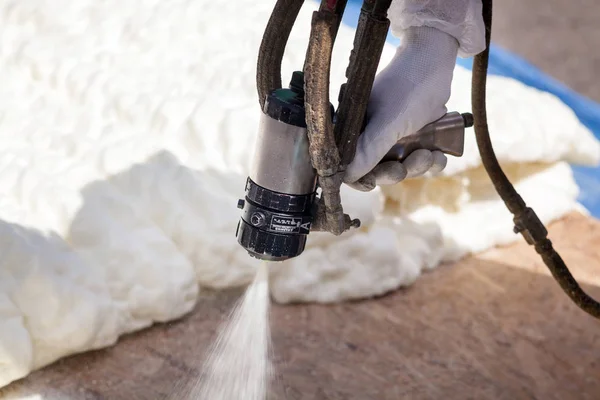Spray foam insulation is an incredible choice for any residential, commercial or industrial space for a wide variety of reasons. Excellent insulation can lower your heating and cooling bills, provide your walls and floors with convenient sound-dampening properties and can even improve the structural integrity of your building.
Before you invest in spray foam for your building, you should first understand all of the ins and outs of it. This informative article will help you learn more about:
- What Is Spray Foam?
- The Two Main Types Of Spray Foam That You Can Consider.
- The Top Benefits Of Using Spray Foam Over Other Types Of Insulation.
What Is Spray Foam Insulation?
Spray foam, specifically polyurethane spray foam, can be used to insulate buildings. It can provide you with insulation, moisture barriers, noise isolation and more.
Spray foam itself is a composite material that gets formed when separate chemicals, which are kept separate until propelled by a spray gun, meet. Once the foam is expelled from the applicator, it can expand and fill up the space between your walls, floors and more.
Inside this foam are pockets which are known as cells. These cells make it more difficult for sound and heat to pass through the dried foam, which means your building will lose less heat, and sound won’t pass through your walls as easily.
Because spray foam expands once it’s applied, it can grow and completely fill the space that it was installed into. Meaning there won’t be large empty gaps in your walls that result in insufficient insulation. Smart spray foam installers know the best ways to spray expanding foam in a way that makes it efficiently fill any space.
What Types Of Spray Foam Insulation Are There?
There are basically two main types of foam that you can choose for your insulation needs: open cell and closed cell. Neither of these foams is better or worse than the other; rather, you should select one based on the type of effects you’re trying to achieve.
The differences between these two are:
Open Cell Foam. In open cell spray foam, the pockets, or ‘cells,’ aren’t completely sealed off. This means the spray is softer and more flexible even after it’s dried. Open cell foam is less dense than its closed cell counterpart. Open cell foam also expands much more than closed cell foam once it’s sprayed.
Open cell foam is ideal for providing insulation that also has excellent sound-dampening properties. Because this foam expands so much, it can fill small nooks and crannies that are difficult to reach with closed cell foam.
Closed Cell Foam. The cells are fully closed in closed cell foam. This foam is much more stable and rigid than open cell foam and is about three times as dense. Closed cell foam is a better insulator and has a higher R-value, which refers to a foam’s resistance to heat flow.
Unlike open cell foam, closed cell foam does not expand as much after being applied. Therefore reaching every bit of space could be more of an issue. However, closed cell spray foam insulation is a better insulator and is more robust. It can even improve the structural integrity of the walls that it’s installed into.
What Are The Biggest Benefits Of Using Spray Foam For Insulation?
Why should you choose spray foam over other types of insulation? More specifically, why choose polyurethane foam?
The are so many amazing advantages of choosing this excellent foam:
- High R-Value. R-value refers to how well an insulator insulates buildings, and polyurethane foam has over twice the R-value of most other types of insulation.
- Excellent Acoustics. Constant noise can make doing anything difficult. This foam insulation can dampen sound and isolate noise, making your rooms more comfortable.
- Chemical-Resistant. This durable foam is resistant to solvents and hydrocarbons.
- Blocks Pests. Insects and other nasty pests will have a harder time getting through your walls and into your building when you have spray foam installed.
- Moisture Barrier. Moisture and condensation can cause serious issues if it gets into and lingers in your walls and structure. Spray foam, especially closed cell foam, can minimise the moisture that encourages dangerous mould growth.
- Improved Stability. Strong spray foam can make your structure more robust, meaning your entire building will be more stable.
How Can I Use Spray Foam Insulation In New Zealand?
As you now know, spray foam makes for a fantastic insulation choice. It can provide you with so many benefits alongside being a great insulator – and if you choose us at NZ Application Service, we’ll ensure that your insulation is installed efficiently for the best possible results.
We can provide you with both open cell and closed cell options. Are you having trouble deciding what type of foam to get? We’ll help you out! We can discuss the type of building you want to insulate, your desired results and other factors to determine your best choice. Call us at 0275413097 or visit our website for more details.
Rely on NZ Application Service to provide you with exceptional spray foams, coatings and installation services.
